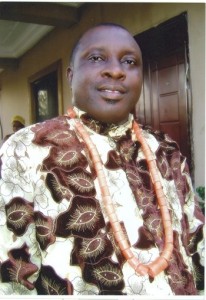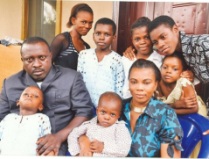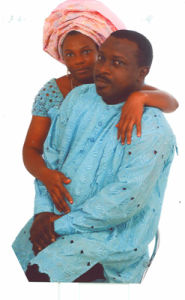Pius Ughakpoteni is both an RKC graduate and a student. He was so happy with his studies in the MALIC programme that he enrolled in the Leadership and Sustainability MBA where he is now. Looking forward, he has been accepted to Middlesex University in London where he will obtain his doctorate. All of his studies come together in his work for the Niger Delta Development Commission where he has worked for several years.
 Kelly Boler: Tell us about yourself. Background: work, life, family.
Kelly Boler: Tell us about yourself. Background: work, life, family.
Pius Ughakpoteni: I obtained a B.Sc. (Management) from the University of Calabar, Nigeria, in 1991. Thereafter, I went into journalism and had an extremely satisfying career. A providential detour took me to the public service and culminated in a blossoming public relations career.
In 2011 I took a momentous decision to go back to school for a Master’s degree in Leading Innovation and Change, MALIC, without leaving work. I started the MALIC studies at Robert Kennedy College on September 1, 2011.
It was a highly challenging adventure, as I studied alongside carrying out my duties as a member of the management cadre in the Niger Delta Development Commission and running a nuclear family of almost 10, but coming to RKC ignited my longstanding desire to reach the pinnacle of education. Hence, since October 2012, I have been doing an MBA in Leadership and Sustainability, also at RKC, which coursework I should complete by the end of 2013. Moreover, with the MALIC, I have been admitted for a Doctorate degree at Middlesex University, London.
KB: You are an Assistant Director in the Niger Delta Development Commission. What do you do there?
PU: The Niger Delta Development Commission is an agency of the Federal Government of Nigeria created to bring about change in the well-endowed but highly beleaguered Niger Delta region, and facilitate its speedy, even and sustainable development. As Assistant Director in the Corporate Affairs Department, I work with the Head, Corporate Affairs, and other colleagues to position NDDC in the minds of its different publics as an organisation that delivers projects and programmes which meet their needs in a cost-effective, timely and transparent manner.
KB: Has your study at RKC helped in your work?
PU: Absolutely! My study at RKC has deepened my insight into the different antecedents of innovation and successful change that need to be strengthened in my work and working environment. It has boosted my concern for people. It has enabled me to respect others’ perspectives, even seek contrary or novel views and value the contributions people can make no matter what their status in the organisation.
KB: What was the best part of your experience doing the online degree?
PU: Beyond the extremely fruitful online and extra-curricular discussions with fellow students, I cherished the very helpful feedback I received from RKC faculty on my various mid-term and final assignments. In addition, memories of the face-to-face meetings with some fellow students as well as RKC and York St John University faculty at the Residency will linger for long.
KB: Describe your favorite local food.
PU: It is starch and banga soup. Starch is a solid, favorite food of mine that is prepared by mixing a solution of cassava starch with a little palm oil and stirring it while over heat until it changes from fluid to solid state. Thereafter it is eaten by skillfully cutting it in lumps which are dipped, one after another, into banga soup. For me, the soup has to be densely populated with pieces of dry fish and cow head.
KB: Are you reading anything right now?
PU: O yes, of course. For a few weeks now I have been reading Dr. David Costa’s The Portable Banker. Today, I also started re-reading Research Methods for Business Students by Saunders, Lewis and Thornhill.
KB: Do have any favorite books about innovation that have influenced you?
PU: Well, I have found Managing Innovation and Change: A critical Guide for Organizations by King and Anderson very useful. It is succinct but deep and loaded.
KB: Who are your heroes in the working world?
PU: I admire people who, by sheer determination, dint of hard work, and faith in God, surmount obstacles without being discouraged and work their ways to the top.
KB: What is your motto?
PU: With God in you and you in Him all things are possible, provided you work hard and smart.



